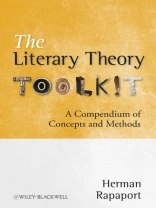The Literary Theory Toolkit offers readers a rich compendium
of key terms, concepts, and arguments necessary for the study of
literature in a critical-theoretical context.
* Includes varied examples drawn from readily available literary
texts spanning all periods and genres
* Features a chapter on performance, something not usually
covered in similar texts
* Covers differing theories of the public sphere, ideology,
power, and the social relations necessary for the understanding of
approaches to literature
Tabla de materias
Preface
Chapter 1: Introductory Tools for Literary Analysis
1.1. Basics
1.2. Common Critical Practices
1.3. Literary Language
1.4. Hermeneutics
1.5. Major 20th Century Schools of Critical
Analysis
1.6. Socio-Political Analyses
Chapter 2: Tools for Reading Narrative
2.1. Story and Plot: Fabula and Syuzhet
2.2. Order
2.3. Mimesis/Diegesis
2.4. Free Indirect Discourse
2.5. Interior Monologue
2.6. Diachronic and Synchronic
2.7. Intertextuality
2.8. Dialogism
2.9. Chronotope
2.10. Character Zone
2.11. Focalization
2.12. Narrative Codes
Chapter 3: Tools for Reading Poetry
3.1. Tropes
3.2. Elision
3.3. Resemblance
3.4. Objective Correlative
3.5. Language Poetry
3.6. The New Sentence
3.7. Sound Poetry/Concrete Poetry
3.8. Prosody
Chapter 4: Tools for Analyzing Performance
4.1. Performance Studies
4.2. Realist Theatre: Total Acting
4.3. Konstantin Stanislavski
4.4. Lee Strasberg (The Method), David Mamet (Practical
Aesthetics), Mary Overlie (The Six Viewpoints Approach)
4.5. Epic Theatre
4.6. Theater of Cruelty
4.7. Actions
4.8. Play
4.9. Happenings
4.10. Performance Art
4.11. Guerrila Theatre
Chapter 5: Tools for Reading Texts as Systems
5.1. Aristotle and Form
5.2. The Literary Work as Object of Rational Empiricism
5.3. Saussurean Linguistics
5.4. Levi-Strauss and Structuralism
5.5. Roman Jakobson’s Communication Model
5.6. Roland Barthes’ Hierarchical Structures
5.7. Ideality and Phenomenology of the Literary Object: Husserl
and Derrida
5.8. Dissemination
5.9. Structure as Rhizome: Deleuze and Guattari
5.10. Permutation
5.11. Undecidability: Derrida, Gödel, Lacan
5.12. Simulating Systems: Baudrillard
5.13. Multiplicity: Badiou
Chapter 6: Tools for Social Analysis
6.1. The Public Sphere
6.2. Ideology
6.3. Theories of Power
6.4. The Social Relation
Sobre el autor
Herman Rapaport is Reynolds Professor of English, Wake Forest University, North Carolina, USA. He has published several books on aspects of Jacques Derrida’s work and is currently doing research in the Derrida archives for a forthcoming project Archival Derrida.












